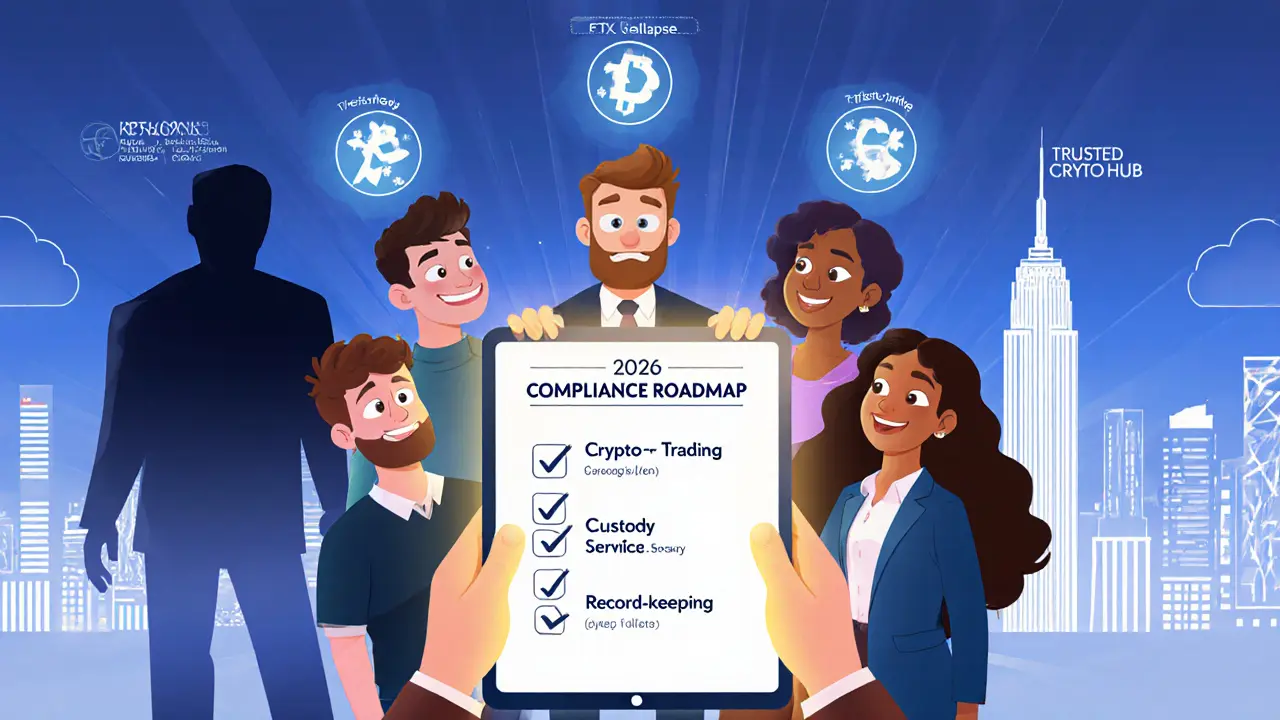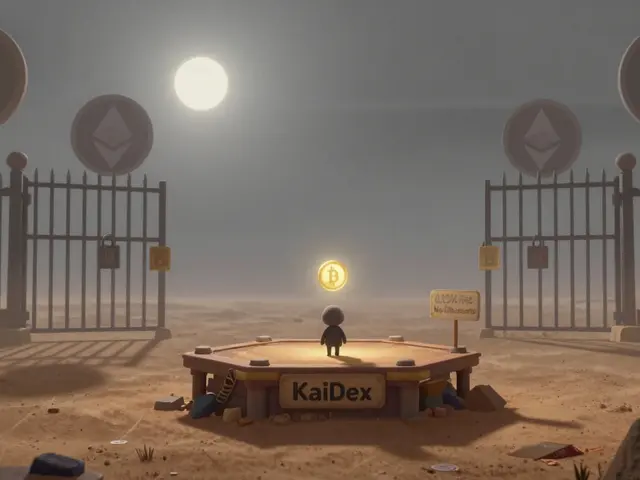AUSTRAC Registration Eligibility Checker
Check if You Need AUSTRAC Registration
This tool helps you determine if your crypto business must register with AUSTRAC in Australia. Based on your answers, it will tell you whether registration is required under current laws.
If you're running a crypto exchange in Australia, you must register with AUSTRAC - no exceptions. It's not a suggestion. It's the law. As of October 2025, any business that swaps Australian dollars for Bitcoin, Ethereum, or any other digital currency - or the other way around - is legally required to be registered. Skip this step, and you're not just risking fines. You're risking criminal charges.
Who Exactly Needs to Register?
Not every crypto business needs AUSTRAC registration. Only those handling fiat-to-crypto or crypto-to-fiat trades. That means:- Online crypto exchanges like CoinSpot or Independent Reserve
- Crypto ATMs that let you buy Bitcoin with cash
- Peer-to-peer platforms that match buyers and sellers of crypto for AUD
What doesn’t need registration? Platforms that only let you trade Bitcoin for Ethereum, or hold crypto in a wallet without converting it to cash. But that’s changing. Starting March 31, 2026, even crypto-to-crypto exchanges will need to register. So if you’re planning to launch a new service, don’t wait. The rules are tightening fast.
What You Need Before You Apply
You can’t just fill out a form and hope for the best. AUSTRAC requires two critical documents before you even submit your application:- AML/CTF Program - This is your company’s rulebook for stopping money laundering and terrorist financing. It must include how you verify customers, monitor transactions, and report suspicious activity.
- Money Laundering and Terrorism Financing Risk Assessment - You need to prove you understand your risks. Are you dealing with high-volume traders? Anonymous users? International transfers? You have to map it all out and explain how you’re managing each risk.
Many businesses get rejected because they skip these steps. AUSTRAC doesn’t send you a checklist. They ask for these documents during review - and if you don’t have them ready, your application gets tossed. There’s no second chance.
The Registration Process
The application is online, but it’s not simple. You’ll need to provide:- Your business name, ABN, and contact details
- Details of your directors and key personnel
- Proof of your AML/CTF Program and Risk Assessment
- Information about your technology systems and how you store customer data
AUSTRAC also uses an online tool to help you figure out if you even need to register. Use it. It’s free. If you’re unsure whether your business model counts as a digital currency exchange, run the assessment first. It saves time, money, and headaches.
What Happens After You Register?
Getting approved isn’t the end. It’s the start. Registered exchanges must keep up with ongoing obligations:- Know Your Customer (KYC) - You must verify every customer’s identity using government-issued ID, proof of address, and sometimes a selfie. No exceptions. Even small transactions require basic checks.
- Transaction Monitoring - Your system must flag unusual behavior. A user suddenly sending $50,000 in Bitcoin? That’s a red flag. You have to investigate and report it to AUSTRAC.
- Reporting Large Transactions - Any cash transaction over $10,000 AUD must be reported within 3 business days.
- Record Keeping - You must keep customer records and transaction logs for 7 years. That includes IP addresses, device IDs, timestamps, and communication logs.
- Annual Compliance Reports - Every year, you must submit a report proving you’re still following the rules.
Failure to meet these obligations can lead to suspension, fines, or even cancellation of your registration. AUSTRAC doesn’t warn you twice. They act.

AUSTRAC vs ASIC: What’s the Difference?
This is where people get confused. AUSTRAC isn’t the only regulator. ASIC (Australian Securities and Investments Commission) handles financial products. So here’s the split:- AUSTRAC - Covers all crypto exchanges that convert fiat to crypto. Mandatory. No exceptions.
- ASIC - Only applies if your crypto is considered a financial product. That includes tokenized shares, derivatives, or investment funds. If you’re selling tokens that act like stocks, you need an AFS license.
Most crypto exchanges only need AUSTRAC. But if you’re launching a new token that promises returns or dividends? You might need both. Don’t assume. Get legal advice.
What’s Changing in March 2026?
The big shift is coming. On March 31, 2026, AUSTRAC’s rules will expand to cover:- Crypto-to-crypto exchanges (e.g., swapping Bitcoin for Solana)
- Custody services (holding crypto for customers)
- Transferring digital assets on behalf of clients
- Services tied to ICOs or token sales
This brings Australia in line with global standards set by the Financial Action Task Force (FATF). Right now, only a handful of countries require this level of oversight. Australia is catching up - and fast. If you’re planning to expand your service, now’s the time to prepare.
Why So Strict?
The FTX collapse in 2022 was a wake-up call. Millions of users lost money because exchanges weren’t transparent, weren’t regulated, and weren’t accountable. Australia responded by launching a "token mapping exercise" in 2023 to classify every crypto asset and figure out who’s responsible for what.There’s no official licensing regime yet - just AUSTRAC registration. But the government is working on it. Draft laws are being reviewed to require exchanges to hold financial services licenses, meet capital requirements, and follow strict consumer protection rules. The goal? To make Australia a trusted global hub for digital assets - not a haven for scams.

Common Mistakes Businesses Make
Most rejections come from avoidable errors:- Thinking "we’re small, we don’t need to register" - Size doesn’t matter. If you’re trading fiat for crypto, you’re covered.
- Using third-party KYC tools without customizing them - AUSTRAC wants your own risk controls, not someone else’s template.
- Ignoring record-keeping - If you can’t prove you verified a customer from two years ago, you’re in trouble.
- Waiting until the last minute - The registration process takes 6-12 weeks. Don’t wait until your launch date.
Many companies hire compliance consultants to handle the paperwork. Firms like Zitadelle AG and Xenia Compliance specialize in AUSTRAC applications. It’s not cheap - but it’s cheaper than getting shut down.
What Happens If You Don’t Register?
The penalties are serious:- Fines up to $22.2 million AUD for corporations
- Up to 10 years in prison for individuals
- Public naming - AUSTRAC publishes names of non-compliant businesses
- Bank accounts frozen, payment processors cut off
And it’s not just legal risk. Customers won’t trust you. Banks won’t work with you. Partners will walk away. In crypto, reputation is everything. One regulatory violation can kill your business overnight.
How to Stay Compliant
Here’s your checklist for 2025:- Use AUSTRAC’s online tool to confirm if you need registration
- Build your AML/CTF Program - don’t copy-paste from another company
- Complete your ML/TF Risk Assessment - be specific about your customers and flows
- Implement KYC with real identity verification - not just email or phone
- Set up automated transaction monitoring
- Start keeping records now - even if you’re not registered yet
- Plan for March 2026 changes - update your systems now
Don’t wait for AUSTRAC to come knocking. If you’re operating in Australia, you’re already under their watch. Be ready.
Do I need AUSTRAC registration if I only trade crypto-to-crypto right now?
As of October 2025, no - you don’t need to register if you only exchange one cryptocurrency for another. But that changes on March 31, 2026. After that date, all crypto-to-crypto exchanges must register with AUSTRAC. If you’re planning to offer this service, start preparing now.
Can I operate a crypto exchange without an ABN?
No. You must have a valid Australian Business Number (ABN) to apply for AUSTRAC registration. The ABN is part of your business identity, and AUSTRAC uses it to verify your legal status. If you don’t have one, apply through the Australian Business Register before starting your registration process.
Does AUSTRAC registration mean my crypto is legal?
Registration means you’re compliant with anti-money laundering laws - not that your crypto products are approved or endorsed. AUSTRAC doesn’t assess whether your tokens are safe, valuable, or legitimate. It only checks if you’re following rules to prevent crime. You still need to follow consumer protection laws and avoid misleading customers.
How long does AUSTRAC registration take?
The process usually takes between 6 and 12 weeks if your application is complete and accurate. If you’re missing documents - like your AML/CTF Program - it can take much longer. Many businesses delay registration because they’re not ready. Start preparing at least 3 months before you plan to launch.
Do I need to register if I’m based outside Australia but serve Australian customers?
Yes. If your business targets Australian customers - even if you’re based overseas - you’re required to register with AUSTRAC. This includes websites that accept AUD, advertise in Australia, or have Australian users making deposits. Location doesn’t matter. Customer location does.
What if I’m just a crypto ATM operator?
Crypto ATMs that let users buy Bitcoin with cash or sell Bitcoin for cash are considered digital currency exchanges under AUSTRAC rules. You must register, even if you only have one machine. The same AML/CTF Program and KYC rules apply. Many operators use third-party KYC providers to handle identity checks at the machine.
Can I apply for AUSTRAC registration myself, or do I need a lawyer?
You can apply yourself, but most businesses hire compliance experts. The AML/CTF Program and Risk Assessment require legal and operational expertise. A poorly written program will get rejected. If you’re not familiar with financial regulations, professional help saves time, avoids mistakes, and increases your chances of approval.




24 Comments
Becca Robins
lol who even has time for this? just use binance and call it a day 🤷♀️
Janna Preston
I’m confused-so if I trade BTC for ETH on a US site but live in Australia, do I still need to register? Or is it only if the platform targets Aussies?
Alexa Huffman
Great breakdown. Just want to clarify: even if you're a small operator with one crypto ATM, you're still in scope. AUSTRAC doesn't care about scale-only activity. Don't assume you're too small to matter.
Noah Roelofsn
This is actually one of the most forward-thinking regulatory frameworks in the world. The US is still stuck in 'regulate by enforcement' mode, while Australia’s building real guardrails. Kudos to them. The FATF alignment is smart-no more offshore loopholes.
Meagan Wristen
I work with a lot of small crypto businesses and honestly, the biggest hurdle isn’t the paperwork-it’s the fear. People think they’re gonna get arrested if they file. But AUSTRAC isn’t the police. They’re just trying to keep the system clean. If you’re legit, you’ve got nothing to fear.
Pranjali Dattatraya Upadhye
I’m from India and we’re watching this closely. Our RBI is still blocking crypto like it’s a virus, but seeing Australia step up like this? It gives me hope. Maybe one day we’ll have clear rules too-not just bans.
andrew seeby
bro i just bought some dogecoin on robinhood and now i'm scared i'm gonna go to jail 😅
Sierra Rustami
Australia thinks it’s the center of the crypto world. Newsflash: no one cares. If you want to be a compliance nanny, go ahead. But don’t pretend you’re leading innovation.
Steven Lam
you gotta be kidding me another country making crypto harder to use why dont they just ban it and be done with it
Christopher Evans
The requirement to retain IP addresses and device IDs for seven years raises serious privacy concerns. While compliance is necessary, this level of surveillance sets a precedent that may be difficult to roll back.
Missy Simpson
You got this! 💪 Starting early on the AML program is the secret sauce. I know it’s boring, but it’s the difference between thriving and getting shut down. You’re not just following rules-you’re building trust.
Wendy Pickard
I appreciate how clear this is. So many posts just throw jargon at you. This one actually tells you what to do, step by step. Thank you.
Abelard Rocker
Let me tell you something-this whole AUSTRAC thing is a bureaucratic nightmare dressed up as 'consumer protection.' They don't want you to succeed. They want you to beg for permission. And don't get me started on the 7-year record-keeping. Who the hell keeps digital logs for seven years? That’s not compliance, that’s digital hoarding. And now they’re coming for crypto-to-crypto? Next they’ll be auditing your private wallet addresses. This isn’t regulation-it’s control. And it’s terrifying.
Chloe Walsh
so like... if i use a decentralized exchange like uniswap and swap usdc for dai... am i a criminal now? 😭
Arjun Ullas
This is a masterclass in regulatory clarity. In India, we are drowning in ambiguity. AUSTRAC’s approach-clear thresholds, documented risk assessments, mandatory KYC-is the gold standard. Any business operating in Australia must treat this not as a burden, but as a competitive advantage. Compliance is the new trust signal.
Veeramani maran
the AML/CTF program is just a template you copy from some consultancy site right? everyone does it. no one actually reads it. just slap your logo on it and submit
Jessica Arnold
There’s a philosophical tension here. On one hand, regulation prevents abuse. On the other, it centralizes control over what was meant to be decentralized. Is compliance the price of legitimacy-or the surrender of ethos?
Jacque Hustead
I’m really glad someone laid this out so plainly. So many people think this is just for big players, but even a one-person crypto ATM business needs to comply. It’s not about size-it’s about function. Thanks for the clarity.
Robert Bailey
Just started my own small exchange and this saved me weeks of googling. Seriously, do the risk assessment first. It’s not optional. It’s your roadmap
Robin Hilton
Australia is becoming the Singapore of crypto regulation. And frankly, I’m impressed. They’re not banning it. They’re not ignoring it. They’re building a framework that actually works. If you’re serious about crypto, you want to be in a place like this.
Hope Aubrey
I’ve been reading this for 20 minutes and I’m still crying. I just wanted to buy some crypto and now I have to write a 50-page risk assessment? This is emotional abuse. Who designed this? A bureaucrat with a trauma background? I need a therapist, not an AML program.
Nitesh Bandgar
I’ve seen this before. First they make you register. Then they make you pay for a license. Then they audit your code. Then they ban your tokens. Then they shut you down. This isn’t regulation-it’s a slow-motion execution. And they call it ‘consumer protection.’ What a joke.
Vipul dhingra
You think this is bad? Wait till the US catches up. Then you’ll see real oppression. Australia is still playing nice. In America, they’ll send the FBI to your house if you don’t file Form 8300 for a $10,000 BTC trade. You think you’re stressed now? Just wait.
Grace Huegel
I find it fascinating how regulatory bodies weaponize language. 'AML/CTF Program' sounds so technical, so professional. But really, it’s just a euphemism for 'spying on your customers.' And yet, everyone nods along as if it’s noble. How did we get here?